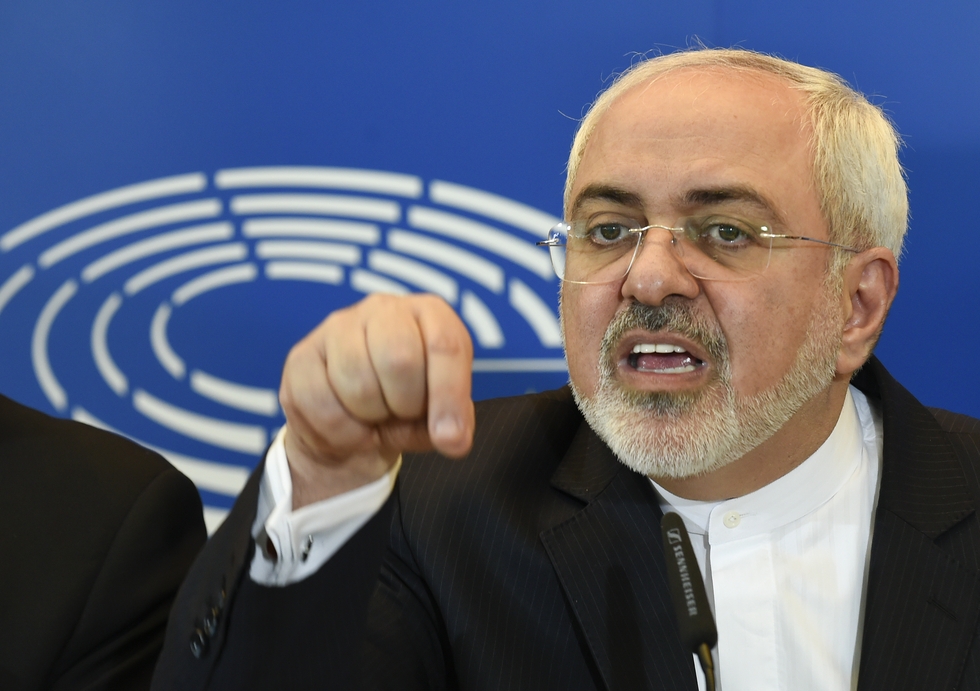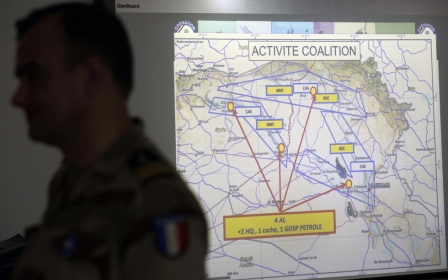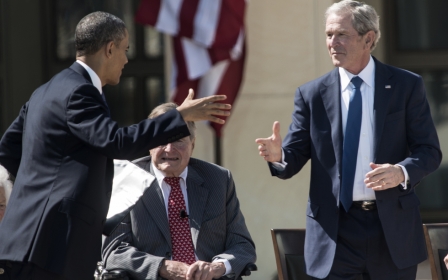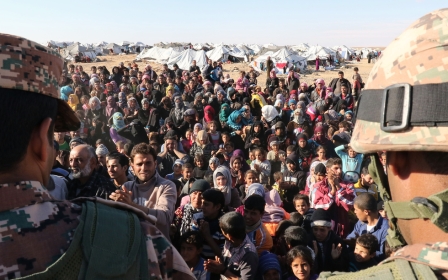For the sake of peace, get out of Syria

In his customary deceitful way, Iranian Foreign Minister Mohammad Javad Zarif sought to portray Iran as a pleasant country, ready for dialogue with stubborn and hard-line Saudi Arabia. He told an audience at the Munich security conference last week: "We believe there is nothing in our region that would exclude Iran and Saudi working together for a better future for all of us," adding that extremists "are as much a threat to our brothers in Saudi Arabia as they are to the rest of the region. We are bound by a common destiny."
It is still better than the common Iranian rhetoric which claims that Saudi Arabia and Daesh are two sides of the same coin. As Zarif was presenting himself as peaceful lamb, his comrades in the Revolutionary Guard were raising their flags on what was left of a mosque minaret in northern Syria, watching broken women carrying white flags march by.
Those civilians are not Daesh, but some of them might join it after being radicalised due to what Iran is doing in Syria. So to have a joint fight with the Saudis against Daesh, Tehran must change its policies.
Iran looks at the region, particularly Syria, from a sectarian angle. The militias Tehran is relying on, some of which come from as far as Afghanistan, are sectarian. They raid Syrian villages with sectarian slogans, bringing to life conflicts from over a thousand years ago. With blood and sectarianism, Iran is redrawing the map of the region.
Official Saudi policy, on the other hand, is not sectarian, despite occasionally appearing so, thanks to the foolish remarks of some of its preachers. Those preachers must be stopped as they are harming Saudi Arabia and hindering Riyadh's attempt to join ranks with the free world. They make Saudi Arabia look like Iran, and the conflict appears as sectarian in the eyes of the West.
Riyadh hosted and supports the High Negotiations Committee of the Syrian opposition, whose members belong to the country's different political, religious and ethnic makeup: Sunnis, Alawites, Christians, ex-Bathists, Muslim Brotherhood, liberals, Salafists, Arabs, Kurds, and Turkmen. All were welcomed and aided by Riyadh to reach an agreement that affirms democracy and pluralism for their country.
Iran on the other hand cannot provide such a list. Its powerful allies fighting in Syria are mainly sectarian, with the exception of Russia. Moscow does not care about Syrians and uses Syria as part of its strategic battle against the West.
Meanwhile, Riyadh backs pluralism in Syria in accordance to what Syrians want. It doesn't have a political project to export to Syria; whatever Syrians agree on is accepted by Riyadh. What matters is having a free and stable Syria.
The Iranian project revolves around Bashar al-Assad, who is morally bankrupt and is finished politically. The Arab Spring has ended him the way it ended military rule in Egypt – although that has returned to power again by force – and the "one man rule" model in Yemen, Tunisia and Libya. True, all of these countries are going through a difficult birth-giving stage, but they are all in the right historic path to democracy and pluralism – in direct contrast to the Iranian project.
If Zarif is honest in wanting an independent, terror-free, stable and plural Syria, then why does Iran back a dictator who – along with his father before him – opposed pluralism and ran the country with oppression with the help of 22 intelligence bodies?
If he cares about pluralism, which was among the objectives of the Syrian uprising five years ago, then why wouldn't Iran back the document signed by the High Negotiations Committee instead of insisting on "stability" under Assad? The old Saudi monarchy seems to be more understanding of the Syrian revolution than the "revolutionaries" of Iran.
During a Russian-sponsored visit of Syrian intelligence chief Ali Mamlouk to Jeddah last summer, the Saudis listened directly to the Syrian regime. Riyadh, according to a leaked report, offered to halt Saudi support for Syrian rebels if Iran and Lebanon's Hezbollah withdrew from Syria, to make the conflict free of foreign elements. But Mamlouk did not return to Saudi Arabia to convey the reply of his superiors. The real response was the commencing of Russian air raids in Syria last September.
Mr Zarif, there is no shared vision between the Saudis and Iranians in Syria. Iran must leave Syria so that Syrians can enjoy peace and for us to avoid a greater regional war.
- Jamal Khashoggi is Saudi columnist and the general manager of Alarab TV satellite news channel. You can follow him on Twitter @JKhashoggi
The views expressed in this article belong to the author and do not necessarily reflect the editorial policy of Middle East Eye.
Photo: Iran Foreign Minister Mohammad Javad Zarif talks to the press after appearing before at the European Parliament's foreign affairs committee at the EU headquarters in Brussels, on 16 February, 2016 (AFP).
New MEE newsletter: Jerusalem Dispatch
Sign up to get the latest insights and analysis on Israel-Palestine, alongside Turkey Unpacked and other MEE newsletters
Middle East Eye delivers independent and unrivalled coverage and analysis of the Middle East, North Africa and beyond. To learn more about republishing this content and the associated fees, please fill out this form. More about MEE can be found here.





